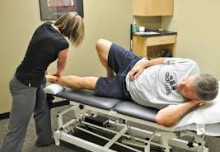 Yes, you are supposed to ask why being male and over 65 is a medical condition; so what do I mean by cure? The best “cure” at any age is appropriate prevention, and I would like to offer some prevention guidelines for any of you who have a loved one over age 65. I offer 65 because as we all age, what we should be screening tends to change along with the frequency of screening. I am starting with men in this posting, but I will offer a parallel “cure” for women in my next post.
Yes, you are supposed to ask why being male and over 65 is a medical condition; so what do I mean by cure? The best “cure” at any age is appropriate prevention, and I would like to offer some prevention guidelines for any of you who have a loved one over age 65. I offer 65 because as we all age, what we should be screening tends to change along with the frequency of screening. I am starting with men in this posting, but I will offer a parallel “cure” for women in my next post.
Blood Pressure – everyone should have their blood pressure documented annually, and hopefully by the same provider so that they can track any trends. If your older man already has diabetes or heart disease, this monitoring should be at much shorter intervals.
Oral Hygiene – a cleaning and an exam once a year is the minimum, and most dentists recommend a cleaning twice a year. Appreciate that oral health is correlated with heart health, so consider your trip to the dentist to have more benefit that just a great smile.
Cholesterol Levels – if your cholesterol have been within normal ranges in the past, you may need to check them only about every five years. As with blood pressure, however, if your older male has heart disease or diabetes, this should be more frequent.
Colon Health – guidelines suggest annual stool sample screenings, but a flexible sigmoidoscopy is suggested only every five years and a colonoscopy every ten years. The U.S. Preventive Services Task Force has recommended talking with a provider after age 75 and no invasive testing after 85. All of this is much more aggressive for anyone with colon issues or cancer or who has a family history of any of that.
Eye Health – a vision exam is generally recommended every other year as a screen for glaucoma or visual acuity, unless the older patient has diabetes. More frequent testing for a diabetic is recommended to watch for diabetic retinopathy.
Immunizations – keeping current is the important part of immunizations. For pneumonia vaccines, every five years is recommended. Flu shots are an annual regimen given the variation in strains that are considered the biggest risks. A shingles vaccination may be a one shot matter, but ask your doctor, and a tetanus booster every ten years is recommended. For other immunizations or other infectious diseases consult a physician.
Prostate Health – most doctors will test the size of the prostate during an annual exam, and the doctor also is the best one to advise on how often a patient should take a PSA test.
Bone Density – although women are more at risk for osteoporosis than men, the risk increases appreciably after age 50. Taking in calcium and some vitamin D along with aerobic exercise will go far in maintaining bone health, but a physician may recommend how frequently to measure bone density.
Everything else – annual exams are a great time to assess weight, height and hearing. It also can be a good time to check your 65 year old for signs of depression as well as go over all medications and any possible interactions or contraindications.
Charlotte Bishop is a Geriatric Care Manager and founder of Creative Care Management, certified professionals who are geriatric advocates, resources, counselors and friends to older adults and their families in metropolitan Chicago. Please email your questions to info@creativecaremanagement.com.







